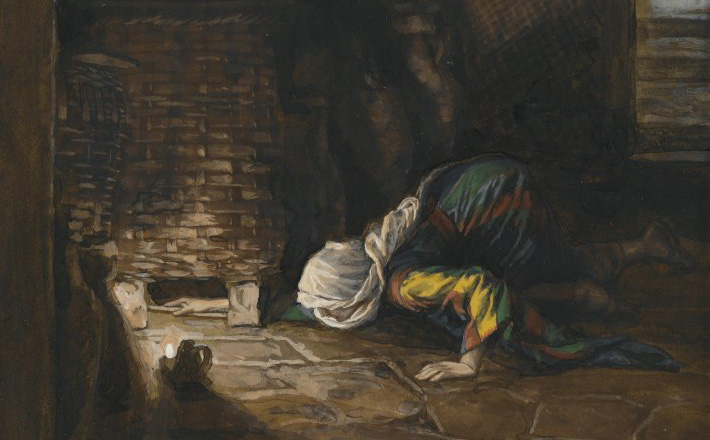Commentary on Luke 15:1-10
The fifteenth chapter of Luke consists of three parables: the Lost Sheep (verses 3-7); the Lost Coin (verses 8-10); and the Prodigal Son (verses 11-32).
The chapter begins with a contrast between “tax collectors and sinners” and “Pharisees and scribes.” Apparently, sinners are drawn to Jesus, but religious leaders complain that he accepts and even eats with sinners (15:1-2). What is it about Jesus and what he does that elicits such different responses?
Mark notes these differing responses to Jesus (2:15-16). Matthew develops the theme (9:10-11; 11:19; 21:31). But it is Luke who brings it to the fore. In two stories, Jesus addresses tax collectors — Levi (5:27-39) and Zaccheus (19:1-10) — and then feasts in their homes. In another, a “sinful woman” kisses and anoints Jesus’ feet with ointment at a dinner in a Pharisee’s home (7:36-50). In these stories, which have meals as a venue, at least two things happen. First, some kind of transformation takes place in a “sinner’s” life, although Jesus does not judge or remark on any sinful behavior. Second, Pharisees criticize Jesus for eating with sinners.
Yet another story compares a Pharisee and tax collector at prayer. The former thanks God that he’s not like these “other people” (i.e., sinners). The latter beats his breast, saying “God, be merciful to me, a sinner!” (18:10-13).
In the chapter preceding our text — set at yet another meal — Jesus describes the kingdom of God as a banquet where the invitations keep extending beyond the original guest list: to the “poor, the crippled, the lame, and the blind” (14:1-24). Continuing the theme, the three parables in chapter 15 conclude with feasts.
After its brief introduction, our pericope contains the parables of the Lost Sheep, drawn from Q material (cf. Matthew 18:12-14) and the Lost Coin, which is found only in Luke. The two parables have a similar structure:
(a) “one” of ninety-sheep and ten coins is lost;
(b) a shepherd goes into the wilderness and a woman searches and sweeps the house until they find what was lost;
(c) they then call “friends and neighbors” to “rejoice” with them;
(d) both parables conclude with an additional comment about “joy” in heaven over “one sinner who repents” (15:7, 10).
The shepherd and the woman in these stories evoke images of a God who not only actively seeks out individuals who are lost — note the emphasis on the “one” out of the ninety-nine and the ten — but also rejoices when they are found. This God is not a tyrant who demands subservience to impossible demands, but rather a God who actively seeks restoration: “a God merciful and gracious, slow to anger, and abounding in steadfast love and faithfulness” (Exodus 34:6; Psalm 86:15, etc.).
In these stories, the drama centers on something that was lost. Paired with both finding (as in chapter 15) and saving (6:9; 9:24), the Greek verb for “lost” (apollumi) refers not only to losing something, but also to causing or experiencing destruction (see, e.g., 4:34; 17:27-33). The television drama Lost that follows the survivors of a crash on a South Pacific island perhaps provides a contemporary sense of this double meaning. It narrates not only what happens to survivors after they are “lost” because of the crash, but also past events that continue to haunt their lives.
So what happens when the sheep or the lost coin are found? Note that the verb here has to do not with forgiving but with finding. The Greek word for “find” (eurisko) occurs seven times in the chapter. When the sheep or lost coin is found, no comment is made on any sinful behavior (as in the stories of Levi, Zaccheus, and the sinful woman), but a connection is made between (a) God’s finding and rejoicing over what was lost and (b) “the one sinner who repents” (15:7; 10).
Unlike the English word repentance, which implies contrition and remorse, the Greek word metanoia has to do with a change of mind and purpose — a shift in how we perceive and respond to life. When God finds us when we are lost, our usual ways of perceiving and responding to life are transformed.
And when this happens, there is great rejoicing over the “one sinner who repents.” In the parable of the Lost Sheep, this phrase is contrasted with “righteous persons who need no repentance” (15:7), echoing the contrast that introduces the parables in chapter 15.
We should note, however, that the emphasis here is not on a contrast between two different types of people: “tax collectors and sinners” versus “Pharisees and scribes.” Reifying these types misses the theological point of these parables and, unfortunately, has led to much violence against Jews in the history of Christianity. Luke does not laud the behavior of sinners. Elsewhere he describes them as people who only look out for what is in their own interest (6:32-34). Tax collectors were corrupt, dishonest, and had colluded with the Roman Empire. By contrast, the Pharisees and scribes were the religious leaders of the day, much like professional clergy in our time.
At issue here are two different types of responses to Jesus and God’s reign. Sinners repent because they know they are lost and thus can avail themselves of the transformation that comes with God’s finding them. By contrast, the righteous do not need to repent (or change their ways) presumably because they don’t think they are lost. They don’t need God to find them; they are justified either in their own eyes or in the eyes of others (16:15; cf. 10:29; 18:14).
Earlier Jesus had warned “unless you repent, you will all perish” — that is, be lost (13:3, 5). Later he will state that he came not for the righteous but to “seek out and save the lost” (19:10). And then there’s the paradox: “those who want to save their life will lose it, and those who lose their life for my sake will save it” (9:24-25).


September 15, 2013